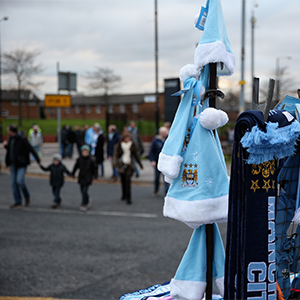The Premier League is 25 years old on 15 August 2017.
To mark the anniversary, BBC Sport has produced five pieces, each covering a five-year period in the competition's history.
This is the final piece, focusing on the span from 2012-13 to the end of the 2016-17 campaign.
Scroll down for written insight, a visual timeline, Mark Lawrenson's team of the era, a tailored tactics board and tables, before testing yourself with our Merlin sticker quiz.
So much had changed in 21 years of the Premier League, yet there had been one constant throughout: Alex Ferguson, who had picked up 12 titles with Manchester United, two Champions Leagues and a knighthood along the way, as well as a head of grey hair and the scalps of most who had dared challenge him.
Few guessed the end was nigh when his Robin van Persie-inspired side won another title at a canter in 2013, although the signs were there if you looked hard enough: the look on the manager’s face when Real Madrid put them out of Europe; a patched-up team of old stagers garlanded by a fine, young Spanish goalkeeper in David de Gea and a Dutch master in Van Persie; a landscape thick with rivals and awash with money.
The transition was smooth – a Scotsman for a Scotsman, the older man endorsing the younger and moving upstairs to the boardroom to keep a paternal eye on it all. Nothing that followed would be.
David Moyes looked happy on the day he arrived and seldom afterwards. He had signed a six-year-contract, unaware that within four he would have been sacked by United and left two other clubs in failure too, haunted both by the man upstairs and a man dressed as the grim reaper when he returned to his old club Everton as blue as he had ever been.
Its third decade left the Premier League morphing again. Wigan, who had fought soccernomics successfully for eight years, went down at last with the FA Cup for company. Only three of the 20 clubs that year were managed by Englishmen; the brightest British talent of his generation, Gareth Bale, proved that European giants could match the lure and lucre at home too. If Roberto Soldado did little to salve the wound for Spurs fans, one of their own would soon emerge to prove that Kane could be just as able.

Roberto Soldado (left) - seven Premier League goals in 52 games. Harry Kane (right) - 78 in 116 games and counting
Little could be big. Bournemouth’s average home crowd of 11,500 mattered less than overly generous owners and a record-breaking television deal, making it possible for comparative tiddlers to land big fish like Nathan Ake for £20m. Social media made fans feel closer to those big names than ever, at least until the rapacious culture commercialised that too, and left Victor Anichebe asking his own account to tweet something that sounded better than it looked.
After a decade of going close in Europe, staying out became the dominant trend. Clubs freed of Champions League responsibilities put together the most impressive title charges, starting with a Liverpool side in 2013-14 who were told by their skipper not to let it slip and then watched him do exactly that.
Steven Gerrard’s men could not repeat their charge, not least because Luis Suarez – 31 league goals that season, including four in one match against Norwich, backed up by partner Daniel Sturridge’s 21 – got his teeth into a far bigger contract at Barcelona. Manager Brendan Rodgers would spend his fee unwisely and follow him out of the door.
Jose Mourinho came back to Chelsea, won another title with John Terry to lift it in his full kit and then showed nothing had changed by blowing up as usual in his third season. Special had been superseded. “By mutual consent” became the emptiest phrase in a shallow era.
Mourinho would soon resurface at United, who mutually consented to the sacking of Moyes’ successor Louis van Gaal two nights after he won them the FA Cup. United were dominant off the field – the largest stadium capacity by 15,000, 65 commercial friends including a global noodle partner, official mattress and pillow partner, Thai-specific motorbike partner and integrated telecommunications partner for Azerbaijan – but ever less inspiring and effective on it.
There was still room for impossible romance. Claudio Ranieri arrived at Leicester on the crest of a slump, having been sacked as Greece manager after they lost to the Faroe Islands. Perhaps inspired by that underdog tale, he pulled off arguably the greatest upset in sporting history, overturning odds of 5,000-1 to take the Foxes from fighting for scraps to the head of the table.
Whether it was down to Buddhist monks, the reburial of Richard III in Leicester cathedral or a one-off season of wonder from Jamie Vardy and Riyad Mahrez, all of football swooned. When Ranieri was sacked nine months later, his team in the Champions League knockout stages but closer still to the bottom three, football sighed and got on with speculating about his successor.
For the first time, dark clouds gathered on the horizon. The fate of England’s national side, supposedly one of the key drivers behind the formation of the Premier League in 1992, nosedived still further with defeat by Iceland and a managerial reign from Sam Allardyce that lasted 67 days and one match.

Sam Allardyce managed Bolton, Newcastle, Blackburn, West Ham, Sunderland and Crystal Palace in the Premier League
English kids struggled to get in clubs’ first XIs and clubs struggled to get kids on the street into their shirts, Madrid and Barcelona becoming staples in every park and playground. The age of spectators inside the ground climbed and the number watching live on television plateaued and then dropped, illegal streams and a certain saturation taking its toll.
The response was an arms race: Pep Guardiola to Manchester City; Antonio Conte to great effect at Chelsea. United gambled the house and then spent and spent again. Arsenal decided to stick not twist and gave Arsene Wenger one more last hurrah. Jurgen Klopp fell in love with Liverpool and Liverpool bounced that love back.
Twenty-five years of money, of mayhem, of fabulous players and unprecedented skill, of scandal and debt and outrageous riches to those whose luck held. And no-one quite sure what might come next, only a jolt at the realisation that so much had happened, and so many years flown past.

17 August 2012: Manchester United fans are delighted and Arsenal fans are outraged as Robin van Persie makes a £24m move from Emirates Stadium to Old Trafford. The Dutch striker had scored 44 goals in 57 games for the Gunners and his country the previous season. He would continue that strike-rate for a resurgent United.
21 April 2013: Liverpool’s Luis Suarez bites Chelsea defender Branislav Ivanovic in a 2-2 draw between the sides at Anfield. The striker is subsequently banned for 10 matches. After another biting incident involving Italy defender Giorgio Chiellini at the 2014 World Cup, the Uruguayan is banned for four months, most of which he sees out as a Barcelona player following a £75m move in July 2014.

8 May 2013: Manchester United manager Sir Alex Ferguson announces that he will retire when the current season ends, after nearly 27 years in charge of the club. He caps his time at the club by leading them to a 13th Premier League title. Everton manager David Moyes replaces him.

1 September 2013: After six seasons at Tottenham, during which he is named Premier League players’ player of the year twice, Wales winger Gareth Bale joins Real Madrid for a world record fee of £85.3m.

22 April 2014: David Moyes is sacked as Manchester United manager 10 months into a six-year deal. United finish seventh, their lowest Premier League finishing position to date. Netherlands boss Louis van Gaal replaces Moyes to become United's first non-British boss.
27 April 2014: Liverpool captain Steven Gerrard slips at the crucial moment, allowing Demba Ba to score the opener in a 2-0 Chelsea win at Anfield. The defeat ends Liverpool’s 11-game winning streak and paves the way for Manchester City to deny the Reds a first title since 1990.

10 February 2015: The Premier League sells television rights to its games for a record £5.136bn, a 71% increase on the previous deal. The first Premier League TV deal - which covered 1992-1997 - was £191m.

29 April 2015: Leicester manager Nigel Pearson has a bizarre exchange with a reporter following Chelsea's 3-1 win at the King Power Stadium. Asked about the criticism he feels his side have faced, Pearson responds: “If you don't know the answer to that question, then I think you are an ostrich. Your head must be in the sand. Is your head in the sand? Are you flexible enough to get your head in the sand? My suspicion would be no”.

8 October 2015: Jurgen Klopp is appointed Liverpool boss, replacing the sacked Brendan Rodgers. The German had been out of work since May, when he ended a seven-year spell at Borussia Dortmund to take a sabbatical.

28 November 2015: Former non-league player Jamie Vardy scores for a Premier League record 11th consecutive match in Leicester's 1-1 draw with Manchester United.

17 December 2015: After losing nine out of 16 league games, and being a point outside the relegation zone, reigning champions Chelsea announce that they have parted company with manager Jose Mourinho "by mutual consent", ending his second spell in charge at the club.

1 February 2016: Ex-Barcelona boss Pep Guardiola agrees a three-year contract to become Manchester City manager for the 2016-17 season. The 45-year-old, currently in charge at Bayern Munich, replaces Manuel Pellegrini, who leaves the Etihad Stadium on 30 June.

2 May 2016: Leicester City's first league title is confirmed, as Tottenham's failure to beat Chelsea leaves them seven points behind the Foxes with two games left. It is a stunning achievement for City, who were bottom with seven games to go the previous season and were 5,000-1 to win the league at the start of the 2016-17 campaign.

27 May 2016: Jose Mourinho is officially confirmed as Manchester United manager and signs a three-year contract. He replaces Dutchman Louis van Gaal, who was dismissed two days after the club's FA Cup win.

9 August 2016: Paul Pogba returns to Manchester United from Juventus for a world record fee of £89m. The French midfielder left United for Juve for £1.5m in 2012.

23 February 2017: Claudio Ranieri is sacked as Leicester City manager less than a year after their shock title victory, with the club still in the Champions League, but just one point outside the relegation places. He is succeeded by his assistant Craig Shakespeare, who guides them to a 12th-placed finish.

12 May 2017: Chelsea win their fifth Premier League and sixth top-flight title, in the debut season of manager Antonio Conte. The Italian had previously won three successive Serie A titles with Italian side Juventus.























